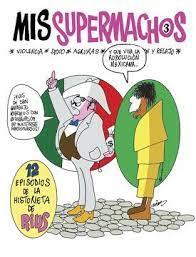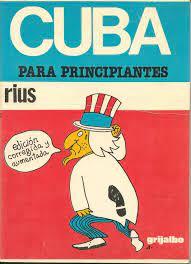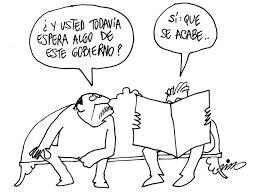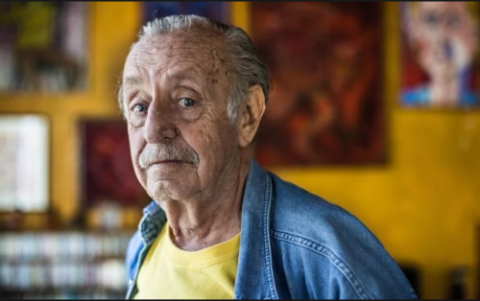Eduardo Humberto del Río García (1934-2017) es nuestro invitado de hoy en este vis a vis. Pero así no lo conoce nadie. Hay que presentarlo como Rius. ¡Ahí sí! Tengo el placer de presentar a este famoso caricaturista, historietista y escritor mexicano.
¿Qué puedo decir de él presentarlo como se merece? Pues ahí voy… De formación autodidacta, empezó a publicar en 1955 en la revista Ja-Já. Desde entonces, ha colaborado en casi todas las revistas importantes de México, como Proceso, Siempre!, Sucesos o Política; en periódicos tanto derechistas como de izquierda: Proceso, El Universal, Ovaciones, La Prensa, y La Jornada. Creó revistas de humor político y blanco: La Gallina, Marca Diablo, La Garrapata, El Chahuistle, El Chamucho y El Chamucho y los hijos del averno.
Hizo dos historietas famosas: Los Supermachos y Los Agachados. Ha publicado más de cien libros, escritos y dibujados por él, los cuales son muy populares principalmente por su humor. En 1970, salió la primera edición en inglés de Rius de su libro Cuba para Principiantes, una historieta humorística cómica, siendo publicado en los Estados Unidos como Cuba for Beginners. El libro no tuvo gran impacto, pero la publicación en 1976 en inglés de Marx for Begginners, una traducción de su obra Marx para Principiantes (1972), una historieta cómica que representaba la vida y las ideas de Karl Marx, llegando a ser un best seller y que dio un impulso para las series de libros For Beginners para escritores y lectores y más tarde un libro ícono.
El actor y director de cine mexicano Alfonso Arau hizo "Calzonzin Inspector", una película basada en las caracterizaciones que aparecían en la revista "Los Supermachos" de Rius.
Ha obtenido muchos premios como el del Salón de Lucca con un trofeo de la UNICEF (1976); 1987, Premio Nacional de Periodismo de México en caricatura (1987 y 2010); La Catrina en la Feria Internacional del Libro de Guadalajara (2004); Premio Reconocimiento Gabriel Vargas por su trayectoria, otorgado por la Secretaría de Cultura de la Ciudad de México y el Museo del Estanquillo.
Espero que lo haya presentado bien, así que a “dialocar” ahora con el Maestro…
PP: Estimado Rius, ¿le gusta que le hagan entrevistas?
RIUS: Por lo general no me gustan las entrevistas, porque me cambian las respuestas. Acepto todas de parte de colegas, pero prefiero hacerlas por este medio para evitar que me las cambien.
PP: No se preocupe que aquí no se le va a cambiar nada. No ganamos nada con eso, al contrario. Así que comienzo… ¿cómo ve el estado de humor en México, en televisión, radio, teatro, literatura y gráfica?
RIUS: Está tan mal el país, que las burradas del gobierno ayudan a que haya más humor en los medios, excepto en la TV que sigue siendo muy controlada, aunque nos permite enterarnos de las burradas del presidente. En general, creo que el momento actual del humorismo en México es de buena salud con muy buenos exponentes en lo gráfico. Aunque debo reconocer que solo me entero de los cartones de los colegas de "la jornada". No sé en los otros cómo vaya...
PP: Siempre México ha dado magníficos humoristas. Me alegro que esté gozando de buena salud. Ahora, Maestro, en casi todos los países de América Latina se dice: "Mi país es un pueblo de humoristas", "en mi país, tú mueves una piedra y sale un humorista", etc., ¿en México se dice lo mismo?
RIUS: En México no nos sentimos todos humoristas, pero sí se habla mucho de un "humor mexicano" que no se da en otras partes, como los "albures" que son juegos verbales agresivos de tipo sexual. Por lo general, nuestro pueblo es serio y solemne, y solo en las borracheras se manifiesta con mucho sentido del humor.
PP: Realmente si me dice que hay sentido del humor, alcohol mendiante, no habla muy bien del humor mexicano. Y si a eso le agrega que se usan muchos esos “juegos verbales agresivos de tipo sexual”, es preocupante el asunto. Pero no se preocupe, en muchos países de Latinoamérica, por lo menos, debido al subdesarrollo económico, cultural, mental, sucede lo mismo. Hay existen excelentes humoristas, pero son pequeñas embarcaciones en un río de ceverza, como dice un amigo mío. Así que es para llorar, pero siempre hay esperanza que suba el nivel del humor popular y la risa gane en calidad. A propósito, ¿cree usted que sea cierta la repetida frase: "Es más fácil hacer llorar que hacer reír?
RIUS: No me he dado cuenta, pues mi pretendida profesión es hacer reír y casi nunca me doy cuenta si lo logro o no...
PP: Es difícil que el humorista gráfico tenga contacto directo con su público al consumir su obra, pero Maestro, no se haga el modesto. Usted sabe muy bien que hace reír, de lo contrario, no existieran sus libros, no se publicarían sus caricatura, sin contar lo que dicen los comentarios críticos, o no le pedirían entrevistas. En fin, no se ponga a llorar ahora, porque eso significa que es más fácil hacer llorar, ¿no? Ja, ja. Una pregunta, Maestro, ¿cuándo decidió hacerse humorista?
RIUS: Decidí hacerme humorista cuando trabajaba en una funeraria, aunque en ese tiempo yo no sabia lo que era un "humorista". Yo pensaba solo en las caricaturas, y como mi ideal en ese ramo era Saul Steinberg, lo veia solo como un dibujante que me daba risa con sus trabajos. Después de muchos años de trabajo, descubrí que mi profesión era la de "humorista gráfico", y pude dormir más tranquilo que cuando no lo sabia.
PP: Otra buena posibilidad de comparar la risa con el llanto en ese trabajo de funerarios, ¿no es cierto? Me gustó eso de que pudo dormir más tranquilo cuando supo que era humorista gráfico. Es que me intersa mucho la teoría del humor y estoy convencido de que los profesionales del humor deberían interesarse por conocer, por aprender todo lo relacionado con su trabajo. Y aunque usted lo haya dicho en broma o lo ha haya dicho de verdad, me gusta. Y ahora otro ángulo del asunto: según usted, ¿el humorista nace o se hace?
RIUS: Yo creo que las dos cosas: debe uno tener cierta tendencia a hacer humor, pero creo que solo leyendo y practicando todos los dias, se acaba uno por volver humorista. Yo vengo de una región del país, (Michoacán) donde la gente es muy "ocurrente" y está siempre haciendo chistes e inventando cosas. Mi mamá tenía mucho de humor involuntario, y posiblemente de ahí me venga lo de "nacer humorista". Y si no, no tiene importancia.
PP: Cuando al inicio le preguntaba si en su país se decír “muevo una piedra y sale un humorista”, me refería a esto. Michoacán entonces es tierra de humorista. El punto es que cualquier vpersona puede ser humorista, porque utiliza -consciente o no-, el lenguaje del humor, los mismos mecanimos, la única diferencia es que uno es aficionado y el otro profesional. Pero son humoristas también. Y quizás de ahí venga su “ADN humorístico”. Pero enfoquémonos en su carrera. Por ejemplo, ¿cuál ha sido el mejor y el peor momento de su carrera hasta el día de hoy?
RIUS: Pienso que el mejor momento de mi carrera fue cuando cobré mi primer cartón en 1954, en la Revista Ja-Já. Y el peor, quizás, cuando el ejército me secuestró para desaparecerme del Planeta por hacer cartones antigubernamentales.
PP: Me imagino el mejor momento. Cuando me publicaron mi primer texto en una reconocida publicación humorística cubana (dedeté), me sentí el tipo más importante del mundo. Pero su momento peor no me lo imagino, porque nunca he sido secuestrado (de la manera típica, se entiende). Ni siquiera le preguntaré cómo fue ese terrible momento. Así que sigamos con algo más “ligero”. Como profesional del humor, ¿se ríe fácil? ¿Con qué tipo de chistes?
RIUS: Sí, me río con facilidad, aunque la situación del mundo y de México no llaman mucho a reírse. Pero como los seres humanos somos tan ridículos, siempre me hacen reír aunque no quiera.
PP: Es cierto, siempre hay una razón para reír aunque uno no lo desee en ese instante. Maestro, ¿alguna anécdota relacionada con nuestra profesión?
RIUS: Realmente no tengo muchas anécdotas que valgan la pena mencionar. Perdón.
PP: Está perdonado, pero creo que se me escapó. No sé por qué intuyo que tiene muchísimas anécdotas. Pero ya buscaré cómo conocerlas, ja, ja. Y dígame, ¿con cuáles colegas se identifica?
RIUS: Me identifico con muchísimos colegas, algunos que he conocido y otros que solo los conozco por su trabajo. Quizás Fontanarrosa es el que más me ha hecho reír, con sus monos y con su plática. Era un humorista nato, pese a ser argentino. Pero la lista es interminable, pues abarca más de 60 años que llevo en esta especie de profesión.
PP: Sí, coincido con usted en que Robert Fontanarrosa fue un humorista genial, y no solo por su enorme talento para escribir o dibujar. En persona me hacía llorar de la risa con su “seriedad”. Lo que me chocó un poco fue eso de “a pesar de ser argentino”. En mi humilde oponión, Argentina es el pías que más humoristas de calidad ha “producido” en la historia de de este Continente. Y en todas las manifestaciones artística. Pero lo entiendo, porque también tienen fama de pesados, engreídos, prepotentes. Y me imagino que se refería a eso. Pero le aclaro que los que tienen esa fama son los porteños, los de Buenos Aires. Aunque mucho de eso ya es mito, porque en esa capital hay de todo, como en cualquier otra del mundo.
Maestro Rius, ha sido un placerazo este vis a vis con usted. Le agradezco enormemente que nos haya regalado su tiempo y su atención. Le deseo que siga teniendo muchos éxitos en su fructífera e importante carrera.




Interview with Rius
By Pepe Pelayo
Human beings are so ridiculous that they always make me laugh even if I don't want to
Eduardo Humerto del Río García is our guest today to talk with us. But no one knows him that way. You have to present him as Rius. There, yes! I have the pleasure of introducing this famous Mexican caricaturist, cartoonist and writer.
What can I say about him presenting him as he deserves? Well here I go... Self-taught, he began publishing in 1955 in the magazine Ja-Já. Since then, he has collaborated in almost all the important magazines in Mexico, such as Proceso, Siempre!, Sucesos or Política; in both right-wing and left-wing newspapers: Proceso, El Universal, Ovaciones, La Prensa, and La Jornada. He created political and white humor magazines: La Gallina, Marca Diablo, La Garrapata, El Chahuistle, El Chamucho and El Chamucho y los niños del averno.
He made two famous comics: Los Supermachos and Los Agachados. He has published more than one hundred books, written and drawn by him, which are very popular mainly for their humor. In 1970, Rius's first English edition of his book Cuba for Beginners, a humorous comic strip, came out, being published in the United States as Cuba for Beginners. The book did not have a great impact, but the publication in 1976 in English of Marx for Begginners, a translation of his work Marx for Beginners (1972), a comic strip depicting the life and ideas of Karl Marx, became a best-seller. seller and which gave impetus to the For Beginners book series for writers and readers and later an iconic book.
The Mexican actor and film director Alfonso Arau made "Calzonzin Inspector", a film based on the characterizations that appeared in the magazine "Los Supermachos" by Rius.
He has won many awards such as the Lucca Show with a UNICEF trophy (1976); 1987, National Journalism Award of Mexico in caricature (1987 and 2010); La Catrina at the Guadalajara International Book Fair (2004); Gabriel Vargas Recognition Award for his career, awarded by the Ministry of Culture of Mexico City and the Estanquillo Museum.
I hope I have presented it well, so let's "discuss" now with the Master...
PP: Dear Rius, do you like being interviewed?
RIUS: In general I don't like interviews, because the answers change. I accept all of them from colleagues, but I prefer to do them this way to avoid them changing them.
PP: Don't worry, nothing is going to change here. We don't gain anything from that, on the contrary. So I begin... how do you see the state of humor in Mexico, on television, radio, theater, literature and graphics?
RIUS: The country is so bad that the government's nonsense helps to create more humor in the media, except on TV, which is still very controlled, although it allows us to find out about the president's nonsense. In general, I think that the current moment of humor in Mexico is in good health with very good graphic exponents. Although I must admit that I only find out about the cartoons of my colleagues from "the day." I don't know how the others go...
PP: Mexico has always produced magnificent comedians. I'm glad you're enjoying good health. Now, Maestro, in almost all Latin American countries it is said: "My country is a town of comedians", "in my country, you move a stone and a comedian comes out", etc., in Mexico is the same thing said? ?
RIUS: In Mexico we don't all feel like comedians, but there is a lot of talk about "Mexican humor" that does not occur elsewhere, such as "albures" which are aggressive verbal games of a sexual nature. In general, our people are serious and solemn, and only when drunk do they show a great sense of humor.
PP: Actually, if you tell me that there is a sense of humor, mendicant alcohol, it doesn't speak very well of Mexican humor. And if we add to that the fact that many of these “aggressive verbal games of a sexual nature” are used, the matter is worrying. But don't worry, in many Latin American countries, at least, due to economic, cultural, and mental underdevelopment, the same thing happens. There are excellent comedians, but they are small boats on a river of beer, as a friend of mine says. So it is to cry, but there is always hope that the level of popular humor will rise and the laughter will gain in quality. By the way, do you think the oft-repeated phrase is true: "It's easier to make people cry than to make them laugh?"
RIUS: I haven't realized it, because my intended profession is to make people laugh and I almost never realize if I achieve it or not...
PP: It is difficult for cartoonists to have direct contact with their audience when consuming their work, but Master, don't be modest. You know very well that you make people laugh, otherwise your books would not exist, your cartoons would not be published, without counting what the critical comments say, or you would not be asked for interviews. Anyway, don't start crying now, because that means it's easier to make people cry, right? Ha ha. A question, Maestro, when did you decide to become a comedian?
RIUS: I decided to become a comedian when I worked in a funeral home, although at that time I didn't know what a "comedian" was. I only thought about cartoons, and since my ideal in that field was Saul Steinberg, I saw him only as a cartoonist who made me laugh with his work. After many years of work, I discovered that my profession was that of "graphic comedian", and I was able to sleep more peacefully than when I didn't know it.
PP: Another good possibility of comparing laughter with crying in that funeral work, isn't it? I liked that he was able to sleep more peacefully when he knew he was a cartoonist. I am very interested in the theory of humor and I am convinced that humor professionals should be interested in knowing, in learning everything related to their work. And whether you said it jokingly or meant it, I like it. And now another angle of the matter: according to you, is a comedian born or made?
RIUS: I think both things: one must have a certain tendency to do humor, but I think that just by reading and practicing every day, one ends up becoming a comedian. I come from a region of the country, (Michoacán) where people are very "happy" and are always making jokes and inventing things. My mother had a lot of involuntary humor, and possibly that's where I got the "born humorist" thing from. And if not, it doesn't matter.
PP: When I initially asked you if in your country they say “I move a stone and a comedian comes out,” I was referring to this. Michoacán then is the land of comedians. The point is that any person can be a comedian, because they use - consciously or not - the language of humor, the same mechanisms, the only difference is that one is an amateur and the other a professional. But they are comedians too. And perhaps that's where his “humorous DNA” comes from. But let's focus on his career. For example, what has been the best and worst moment of your career to date?
RIUS: I think the best moment of my career was when I received my first cartoon in 1954, in the Ja-Já Magazine. And the worst, perhaps, was when the army kidnapped me to disappear from the planet for making anti-government cartoons.
PP: I imagine the best moment. When my first text was published in a renowned Cuban humor publication (Dedeté), I felt like the most important guy in the world. But I can't imagine the worst moment, because I have never been kidnapped (in the typical way, that is). I won't even ask you what that terrible moment was like. So let's continue with something “lighter”. As a humor professional, do you laugh easily? With what kind of jokes?
RIUS: Yes, I laugh easily, although the situation in the world and in Mexico does not encourage much laughter. But since human beings are so ridiculous, they always make me laugh even if I don't want to.
PP: It's true, there is always a reason to laugh even if you don't want to at that moment. Master, any anecdotes related to our profession?
RIUS: I don't really have many anecdotes worth mentioning. Sorry.
PP: It's forgiven, but I think it escaped me. I don't know why I sense that he has many anecdotes. But I'll figure out how to get to know them, ha ha. And tell me, which colleagues do you identify with?
RIUS: I identify with many colleagues, some that I have met and others that I only know through their work. Perhaps Fontanarrosa is the one that has made me laugh the most, with his monkeys and his talk. He was a born comedian, despite being Argentine. But the list is endless, as it covers more than 60 years that I have been in this kind of profession.
PP: Yes, I agree with you that Robert Fontanarrosa was a brilliant comedian, and not only because of his enormous talent for writing or drawing. In person he made me cry with laughter with his “seriousness”. What shocked me a little was that “despite being Argentine.” In my humble opinion, Argentina is the country that has “produced” the most quality comedians in the history of this Continent. And in all artistic manifestations. But I understand it, because they also have a reputation for being annoying, conceited, and arrogant. And I imagine that's what he meant. But I clarify that those who have that fame are the people of Buenos Aires, those of Buenos Aires. Although much of that is already a myth, because in that capital there is everything, like in any other in the world.
Master Rius, it has been a great pleasure to “talk” with you. I greatly appreciate you giving us your time and attention. I wish you continued success in your fruitful and important career.
(This text has been translated into English by Google Translate)

